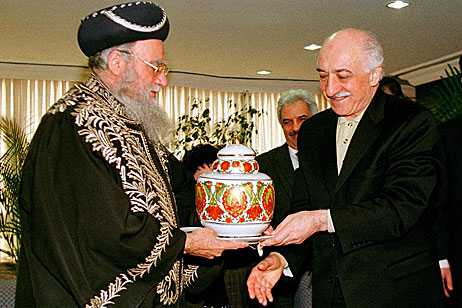Thomas Seibert

ISTANBUL // Cracks have appeared between Turkey’s ruling party and the movement of an Islamic preacher that has been an influential supporter of Recep Tayyip Erdogan, the prime minister.
The movement led by Fethullah Gulen, a 70-year-old preacher who lives in the United States, has been a key supporter of the Erdogan government, which is led by pious Muslims and has roots in political Islam. Some critics say the Gulencis, as the supporters of Mr Gulen are called in Turkey, have gained vast influence over state institutions.
But several decisions by Mr Erdogan have put off the Gulencis, as differences of interests between themselves and Mr Erdogan, a seasoned politician and party leader who always has an eye on the next elections, become apparent.
Mustafa Akyol, a columnist and author of a recent book, Islam without Extremes – A Muslim Case for Liberty, said the views of the Gulen movement, which runs several non-governmental organisations, media and universities in Turkey, matter to the government.
“They have a few million supporters in Turkey, so they have voting power, and they have influence via NGOs and the media,” Mr Akyol said. “There are some differences of opinion that have become more visible,” Mr Akyol said.
Mr Gulen’s influence on Turkish politics is informal, given that Islamic groups are officially banned in Turkey’s secular republic. That is why signs of discord between his movement and the government are often expressed by innuendo and reflected in comments by media outlets close to the two sides, rather than in public statements by key players themselves. Officials at the Journalists and Writers Foundation, the Gulen movement’s flagship organisation in Turkey, were not available for an interview.
Tensions between the Gulencis and the government rose earlier this month when media close to Mr Gulen criticised Mr Erdogan’s decision to reduce sentences for football officials convicted of match-fixing charges. The move by Mr Erdogan’s ruling Justice and Development Party (AKP) was seen as a concession to millions of football fans ahead of a trial against nearly 100 officials and players from prominent clubs accused of having fixed matches with illegal payments.
When Mr Erdogan underwent gastrointestinal surgery on November 26 and withdrew from the public view for two weeks to rest, Mr Gulen remained silent and did not send a message to the prime minister to wish him a speedy recovery, Yeni Safak, a newspaper close to the AKP government, pointed out in a commentary last week.
Differences in other issues surfaced as well. Some members of the Erdogan government said they were concerned about lengthy periods of pretrial detention, including in cases against suspected members of a group accused of plotting to overthrow Mr Erdogan and to blacken Mr Gulen’s name. News reports said the Gulen movement was against changing detention rules that could result in the release of some suspects.
It is not the first time that the Gulencis and the Erdogan government have disagreed about policy issues. When Mr Erdogan took a tough line against Israel after Israeli commandos killed nine Turkish activists aboard the ship Mavi Marmara, which was carrying aid for the Gaza Strip last year, Mr Gulen said in a statement that Turkish authorities should have prevented the Mavi Marmara from setting sail in the first place.
Mr Akyol, the author, said the differences did not mean that the Gulen movement was about to end its support for the government, even though the movement thought that Mr Erdogan was too soft on the Turkish military, for example. “The Gulen movement sometimes accuses the government of selling the cause, of being not bold enough.” But in cases like the relation between the government and the military, Mr Erdogan was taking a pragmatic position because “he has to work with the generals”, Mr Akyol said.
Mr Gulen, who was born in Erzurum in eastern Anatolia, became a well-known preacher and Islamic intellectual in the 1980s and 1990s, when his anti-communism was applauded by Turkish officials.
His movement became known for the high value it places on education, opening schools around Turkey and in former Soviet republics in Central Asia. Mr Gulen teaches that Muslims should play an active part in the modern world and embrace tolerance and technology as well as education.
But Mr Gulen ran into trouble in 1999, when a Turkish television channel broadcast one of his speeches in which he allegedly told his followers to patiently work their way through state institutions in Turkey to reach the highest levels of the republic.
A prosecutor charged him with trying to overthrow the secular republic. Mr Gulen denied the charges and avoided arrest by travelling to the United States. Turkey’s top court threw out the case against him in 2008, but he has not returned yet.
Not everyone in Turkey accepts the view that the Gulen movement is all about tolerance and education. Ayse Hur, a historian, wrote in a recent analysis that the Gulen movement was a religiously motivated “project of social engineering” with nationalist undertones. “It is a total fantasy to expect people with this mindset to solve Turkey’s chronic problems,” the professor wrote in the Taraf newspaper on December 11.
Other critics say the Gulencis have infiltrated state institutions such as the police. In March, Ahmet Sik, a journalist who was about to publish a book about the alleged influence of the movement over the security forces, was arrested on charges that the book was written under orders by militant government opponents as part of a propaganda campaign.
“Those who touch them will burn,” Mr Sik famously said about the Gulencis as he was arrested. He has been in detention since, and his trial started last month. His book was published recently and has become a bestseller in Turkey.

Leave a Reply